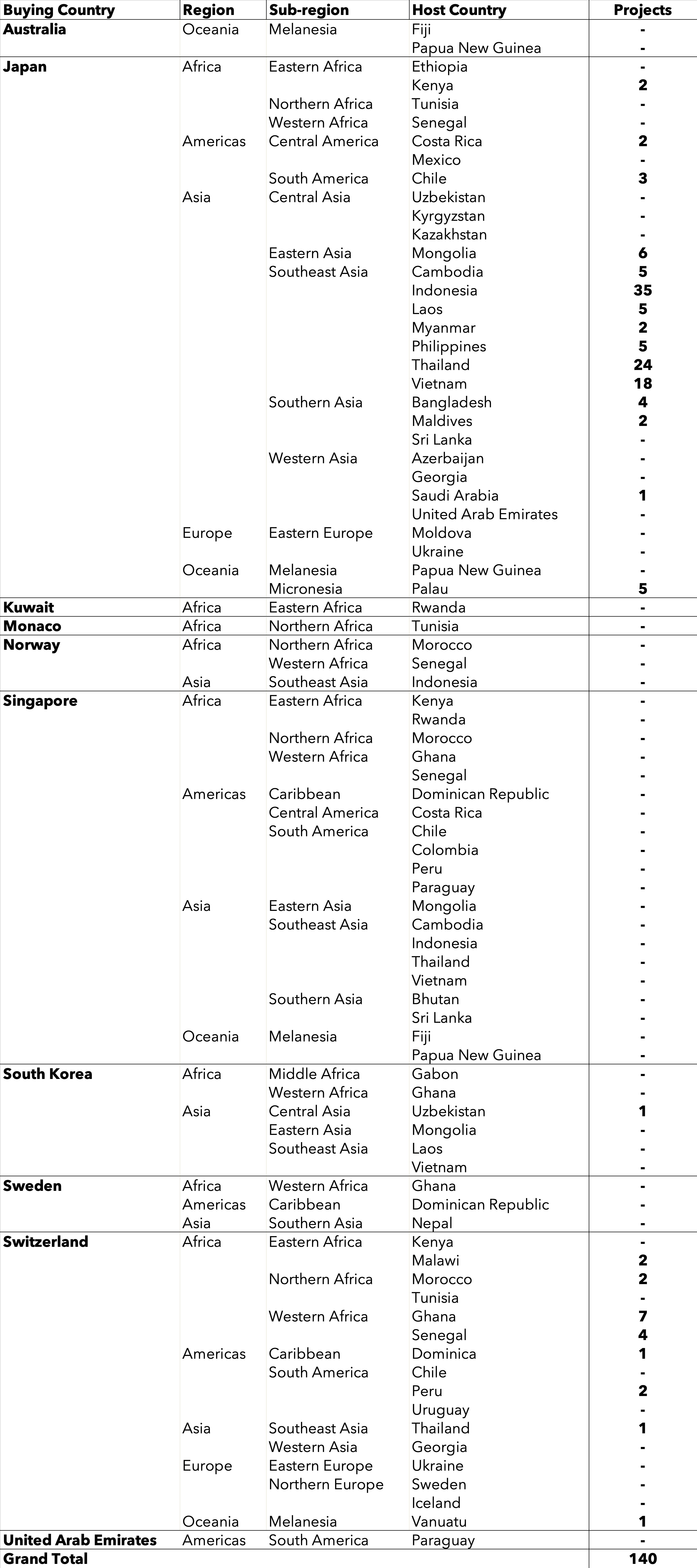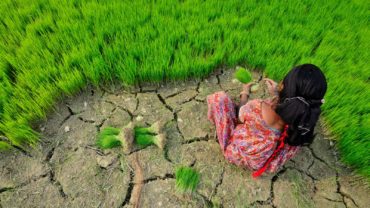Article 6 Pipeline
Article 6 of the Paris Agreement provides a framework for countries to cooperate towards the implementation of their Nationally Determined Contributions (NDCs) through carbon markets (Articles 6.2 and 6.4) and non-market modalities (Article 6.8). These cooperative approaches can help countries to achieve and enhance their NDC targets. The overall objective is to increase climate ambition, promote sustainable development, and safeguard environmental integrity.
Building on the extensive experience from the Clean Development Mechanism (CDM), as a first step, UNEP Copenhagen Climate Centre (UNEP-CCC) has set up an Excel-based database for Article 6 activities. The aim is to provide insights on the development of Article 6 projects, their contribution to countries’ NDC implementation and SDG achievement at the national and global level. Find a short video introducing this work here.
UNEP-CCC will continue expanding this pipeline’s functionality as new Article 6 projects emerge and the modalities become clearer. Ultimately, the pipeline will take the shape of a more interactive and user-friendly platform. This will allow users to easily explore and analyse Article 6 projects data. Additional background on projects potentially transitioning to the Article 6.4 Mechanism can be found in the CDM Pipeline and on the UNFCCC website.
CDM activities that are eligible and have requested transition to the A6.4 Mechanism
The deadline for submitting requests has passed. In a new explainer video, we examine those activities that intend to transition using CDM methodologies and outline the next steps.
Video on the CDM Transition (08:30 minutes) – find the slide deck here
As of 1 May 2024, transition requests were correctly submitted for 1,308 Project Activities (PA), 116 Programmes of Activities (PoA), and (together with these PoAs) 946 Component Project Activities (CPA) (see the figure below). While these numbers are close to the new potential maximum of CDM transitions, there may be additional activities for which re-submissions are possible after the first request did not meet procedural requirements.

Of the potential reductions of around 1.5 billion tonnes of CO2e that eligible activities could generate after transition while using CDM methodologies, this could amount to more than 900 million tonnes (59%).
For more details (such as submissions by host countries, regions, and activity types) please refer to the sheet Analysis CDM Transition in the A6 Pipeline. The list of requests including the link for stakeholder comments can be found here.
Summary of the Article 6 Pipeline’s other components:
1. Overview of the Bilateral Agreements and pilot projects/activities under Article 6.2 of the Paris Agreement
Table 1 provides an overview of signed Bilateral Agreements (BA) for the cooperation under Article 6.2 of the Paris Agreement as of 1 May 2024.
- There are 82 BAs between 10 different buyers and 46 host countries
- A total of 140 pilot projects have been recorded, out of which 119 belong to Japan’s Joint Crediting Mechanism (JCM).

Out of 140 pilot projects, 5 have Authorization Statements. The involved countries – Ghana (3x), Switzerland (4x), Thailand, Vanuatu – also submitted Initial Reports to the UNFCCC. The total expected amount of Mitigation Outcomes from these projects are:
- Promotion of climate smart agriculture practices for sustainable rice cultivation in Ghana (Ghana-Switzerland | Authorized Reductions: 1,126 ktCO2e)
- Bangkok E-Bus Program (Thailand-Switzerland | 500)
- Electrification of Vanuatu’s Inhabited Islands through Solar Power ITMO Programme (Vanuatu-Switzerland | 97)
- Integrated waste recycling and composting for methane reduction in Ghana (Ghana-Switzerland | 1,589)
- Transformative Cookstove Activity in Rural Ghana (Ghana-Switzerland | 3,231)
On 15 December 2023, the first ever issuance of 1,916 ITMOs (Internationally Transferred Mitigation Outcomes) occurred for the E-Bus Program in Bangkok covering the period from October to December 2022. This transaction between Thailand and Switzerland is the first under Article 6.2 of the Paris Agreement.
Table 1 – Bilateral Agreements (BA) between countries on Article 6 of the Paris Agreement and number of projects/activities within the framework of those BAs

Blank cells mean that we have no knowledge of any dedicated Article 6 pilot projects between the two countries. Some countries who signed BAs do not yet publicly provide information on Article 6 pilot activities.
2. Overview of pilot projects/activities
The identified pilot projects fall into following types:

EE = Energy Efficiency
HFCs = Hydrofluorocarbons
Out of the 140 pilot projects/activities, 78% have the host country in Asia, 12% in Africa, 6% in the Americas and 4% in Oceania.
3. Designated National Authorities for Article 6.4 Mechanism

Monthly news on Article 6 Pipeline:
The April 2024 version of the Excel-based Article 6 Pipeline includes the following updates:
- A new sheet (Country Overview) provides a summary of Article 6-relevant information across the Pipeline for each Party.
- Party submissions of Participation Requirements for Article 6.4 were integrated in a separate sheet – so far it includes information from Morocco and Togo.
- Inclusion of one bilateral agreement, between the governments of Rwanda and Kuwait.
- One pilot project between Morocco and Switzerland was added (“Solar Rooftop 500”). Two Swiss projects, one in Ghana and one in Morocco, were removed.
- 35 additional CDM transition requests were published:
- 32 Project Activities
- 3 Programmes of Activities (including 13 Component Project Activities)
- Four Parties indicated their Designated National Authority since the last update: Guatemala, Iraq, Nepal, and the Philippines.
